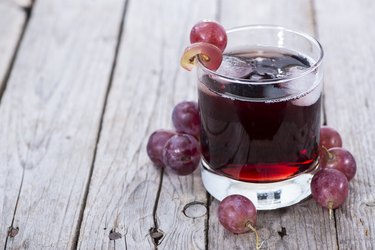
Children and women of childbearing age don't get enough iron in their diets, according to the National Institutes of Health. Grape juice isn't on any iron-rich foods lists, but it does offer other health benefits and may improve the amount of iron your body absorbs from certain types of food.
Tip
Grape juice isn't high in iron. However, many brands of grape juice are fortified with vitamin C, which improves absorption of nonheme iron, which is the type of iron found in plant-based foods.
Video of the Day
Why You Need Iron
Iron is an essential mineral, which means your body can't make it on its own, and it must come from the foods you eat. Though it's a tiny micronutrient, iron supports many vital functions.
Video of the Day
Iron is an important component of hemoglobin, which is found in red blood cells and helps transport oxygen from your lungs to all the tissues in your body. Iron also supports the production of collagen, various neurotransmitters and some hormones. Children need an adequate supply of iron to support physical growth and brain development.
How much iron you need depends on your age and sex. Adult women of childbearing age need 18 milligrams of iron a day, while men and postmenopausal women need 8 milligrams. There's a difference because blood loss during menstruation increases iron needs in women. During pregnancy, women need 27 milligrams of iron a day, however this decreases to only 9 to 10 milligrams daily when breastfeeding.
Iron-rich foods that can help you meet your daily needs include:
- Beef
- Poultry
- Pork
- Beef liver
- Fortified breakfast cereal
- Lentils
- White beans
- Tofu
- Spinach
- Whole-wheat spaghetti
- Potato with the skin
Despite the fact that iron is found in a variety of foods, many groups of Americans, including infants, children, teen girls, pregnant women and premenopausal women, can't seem to meet their daily needs.
Grape Juice for Iron
With only 0.3 milligram per 4-ounce serving, grape juice isn't considered an iron-rich food. However, many grape juice manufacturers add ascorbic acid, which is vitamin C, to their juice to balance the sweetness and improve shelf-life. One serving of grape juice contains 32 milligrams of vitamin C, meeting more than 50 percent of the daily value.
Though iron is essential, bioavailability may be as low as 15 percent, according to a November 2015 study published in The Journal of Nutrition. Bioavailability refers to the amount of iron your body is able to absorb from the foods you eat.
There are two types of iron: heme iron and non-heme iron. Heme iron is found in animal products, such as beef and poultry, and has a higher bioavailability than non-heme iron, which is the plant-based form of iron found in beans, greens and grains.
If most of your iron comes from plant sources, your body may not be able to absorb an adequate amount of iron to meet your needs. That's where grape juice for iron comes in.
Foods rich in vitamin C, like fortified grape juice, enhances the bioavailability of non-heme sources of iron. Drinking a glass of grape juice with your spinach and chickpea salad may help you get more of the vital mineral from the plant-based sources.
Other Grape Juice Benefits
In addition to enhancing iron absorption, adding grape juice to your diet offers other health benefits. In the January 2020 issue of Critical Reviews in Food Science and Nutrition, researchers noted that grape juice is rich in many bioactive compounds that may help improve body weight, lower blood cholesterol levels and reduce the risk of heart disease. However, the researchers also noted that more clinical research is needed to confirm these potential health benefits.
One of the most studied bioactive compounds in grapes and grape juice is resveratrol, which is a polyphenolic compound that grapes produce in response to stress, fungal infection or exposure to ultraviolet light, according to Oregon State University.
The resveratrol in grape juice is a potent antioxidant that protects your cells from oxidative damage. It also reduces your risk of developing blood clots and acts as an anti-inflammatory agent, according to a September 2018 article published in Biomedicines.
When adding grape juice to your daily diet, look for juices that contain 100 percent juice and no added sugar. For additional health benefits, the Mayo Clinic recommends you drink red or purple grape juice.
- National Institutes of Health: "Iron"
- USDA: FoodData Central: "Grape Juice, 100 Percent"
- The Journal of Nutrition: "Total Iron Bioavailability From the US Diet Is Lower Than the Current Estimate"
- Critical Reviews in Food Science and Nutrition: "Grape Juice or Wine: Which Is the Best Option?"
- Oregon State University: "Resveratrol"
- Biomedicines: "Resveratrol: A Double-Edged Sword in Health Benefits"
- Mayo Clinic: "Does Grape Juice Offer the Same Health Benefits as Red Wine"